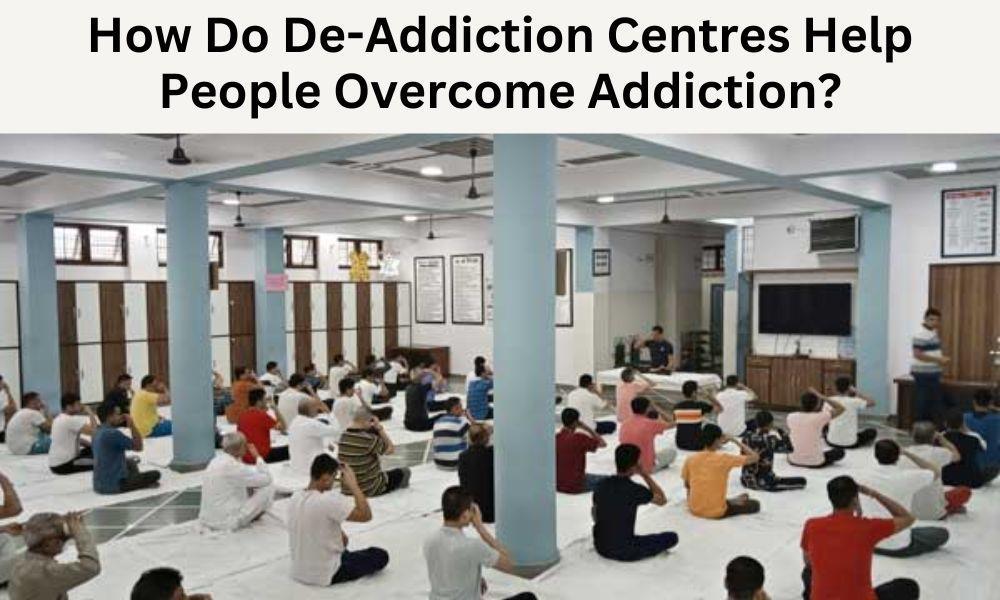How Do De-Addiction Centres Help People Overcome Addiction?

Best De Addiction Centre in Chandigarh, also known as rehabilitation centres, are facilities that provide support and care to people who are struggling with addiction to drugs or alcohol. Addiction is a complex and often chronic condition that can have devastating effects on an individual's health, relationships, and overall quality of life. In this blog, we will explore how de-addiction centres help people overcome addiction through various approaches, therapies, and support systems.

Understanding Addiction
Before delving into how de-addiction centres help people overcome addiction, it's important to understand what addiction is and how it affects the brain. Addiction is a chronic disease that affects the brain's reward and motivation systems, leading to compulsive drug or alcohol use despite negative consequences. The initial decision to use drugs or alcohol is typically voluntary, but as addiction progresses, the individual loses control over their substance use.
Addiction is a complex condition that is influenced by various factors, including genetics, environment, and individual biology. While addiction can occur with any substance, some of the most commonly abused substances include opioids, alcohol, stimulants, and sedatives.
Approaches to De-Addiction
De Addiction Centre in Mohali uses a range of approaches to help individuals overcome addiction. These approaches may include medications, behavioral therapies, and support groups. The specific approach used will depend on the individual's unique needs, the severity of their addiction, and any co-occurring mental health conditions.
Medications
Medications can be an important tool in helping individuals overcome addiction. Medications may be used to help manage withdrawal symptoms, reduce cravings, and prevent relapse. Some examples of medications used in addiction treatment include methadone, buprenorphine, and naltrexone for opioid addiction, acamprosate and disulfiram for alcohol addiction, and nicotine replacement therapies for smoking cessation.
Behavioral Therapies
Behavioral therapies are an essential component of addiction treatment. Best De Addiction Centre in Himachal Pardesh are designed to help individuals change their thoughts and behaviors related to substance use, develop coping skills, and learn how to manage triggers and cravings. Some examples of behavioral therapies used in addiction treatment include cognitive-behavioral therapy (CBT), motivational interviewing, and contingency management.
CBT is a form of therapy that helps individuals identify negative thought patterns and behaviors that contribute to addiction. Through CBT, individuals learn how to replace these negative patterns with healthier ones and develop skills to manage triggers and cravings.
Support Groups
Support groups, such as Alcoholics Anonymous (AA) or Narcotics Anonymous (NA), can be a valuable resource for individuals in recovery. These groups provide a supportive community of individuals who are also in recovery and can offer peer support, encouragement, and accountability. Support groups typically follow a 12-step model and focus on developing spirituality, acceptance, and personal responsibility.
Support groups can also provide opportunities for individuals to share their experiences and learn from others who have been through similar challenges. Many individuals find that participating in a support group can be an important part of their recovery journey.
Inpatient vs. Outpatient Treatment
Best De Addiction Centre in Jammu may offer inpatient or outpatient treatment options. Inpatient treatment, also known as residential treatment, involves living at the treatment facility for a period of time while receiving intensive therapy and support. Inpatient treatment is typically recommended for individuals with severe addiction or those who require medical monitoring or detoxification.
Outpatient treatment, on the other hand, involves attending therapy and support sessions at the treatment centre while continuing to live at home or in a sober living facility. Outpatient treatment is typically recommended for individuals with less severe addiction or those who have completed inpatient treatment and are transitioning back to daily life.
In both inpatient and outpatient treatment settings, individuals receive a combination of medication, therapy, and support to help them overcome addiction. However, the level of intensity and duration of treatment may vary depending on the setting and the individual's unique needs.
Supporting Mental Health
Many individuals who struggle with addiction also have co-occurring mental health conditions, such as depression, anxiety, or trauma. De-addiction centres recognize the importance of addressing these underlying mental health conditions as part of the recovery process.
Treating co-occurring mental health conditions can help individuals better manage their addiction, improve their overall well-being, and reduce their risk of relapse. Deaddiction centres may offer specialized therapy or medication for individuals with cooccurring mental health conditions.
Aftercare and Continuing Support
Recovery from addiction is a lifelong process. De-addiction centres recognize that individuals need ongoing support and care even after they complete their initial treatment. Aftercare and continuing support programs may include regular therapy or counseling sessions, support groups, and ongoing medication management.
De-addiction centres may also provide resources and referrals for individuals seeking employment, housing, or other forms of support. By providing ongoing support and
resources, de-addiction centres help individuals maintain their sobriety and continue on their path to recovery.
Conclusion
De-addiction centres play a critical role in helping individuals overcome addiction. Through a combination of medications, behavioral therapies, and support systems, deaddiction centres provide individuals with the tools and resources they need to manage their addiction and achieve lasting recovery.
While addiction is a complex and chronic condition, recovery is possible with the right support and care. If you or someone you know is struggling with addiction, reach out to a de-addiction centre or a healthcare professional for help.
